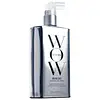What's inside
What's inside
 Key Ingredients
Key Ingredients

No key ingredients
 Benefits
Benefits

 Concerns
Concerns

No concerns
 Ingredients Side-by-side
Ingredients Side-by-side

Water
Skin ConditioningDipropylene Glycol
HumectantPolysilicone-29
Silicone Quaternium-18
EmollientGlycerin
HumectantTrideceth-6
EmulsifyingChamomilla Recutita Flower Extract
MaskingCalendula Officinalis Flower Extract
MaskingPotassium Sorbate
PreservativePhenoxyethanol
PreservativeTrideceth-12
EmulsifyingSodium Benzoate
MaskingChlorphenesin
AntimicrobialPotassium Benzoate
PreservativeDisodium EDTA
Citric Acid
BufferingSulfonated Keratin
Skin ProtectingAlcohol
AntimicrobialPolysilicone-9
Hydrolyzed Keratin
HumectantBenzophenone-4
UV AbsorberSteartrimonium Chloride
PreservativeDipropylene Glycol
HumectantBenzyl Alcohol
PerfumingMalic Acid
BufferingLactic Acid
BufferingSodium Hydroxide
BufferingParfum
MaskingDisodium EDTA
Methylparaben
PreservativePropylparaben
PreservativeLinalool
PerfumingButylphenyl Methylpropional
PerfumingLimonene
Perfuming
 Reviews
Reviews

Ingredients Explained
These ingredients are found in both products.
Ingredients higher up in an ingredient list are typically present in a larger amount.
Dipropylene Glycol is a synthetically created humectant, stabilizer, and solvent.
This ingredient helps:
Dipropylene glycol is technically an alcohol, but it belongs to the glycol family (often considered part of the ‘good’ alcohols). This means it is hydrating and gentle on skin unlike drying solvent alcohols like denatured alcohol.
As a masking agent, Dipropylene Glycol can be used to cover the smell of other ingredients. However, it does not have a scent.
Studies show Dipropylene Glycol is considered safe to use in skincare.
Learn more about Dipropylene GlycolDisodium EDTA plays a role in making products more stable by aiding other preservatives.
It is a chelating agent, meaning it neutralizes metal ions that may be found in a product.
Disodium EDTA is a salt of edetic acid and is found to be safe in cosmetic ingredients.
Learn more about Disodium EDTA